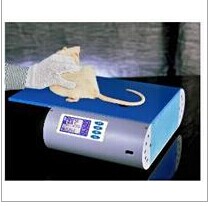
甩尾测痛仪37360
产品名称: 甩尾测痛仪37360
英文名称:
产品编号: 37360
产品价格: 0
产品产地: 意大利
品牌商标: 意大利UGO
更新时间: null
使用范围: null
- 联系人 :
- 地址 : 北京市石景山区古城南街3号9号院绿地环球文化金融城6号楼2311室
- 邮编 : 100166
- 所在区域 : 北京
- 电话 : 138****0664 点击查看
- 传真 : 点击查看
- 邮箱 : info@fhsci.com
甩尾测痛仪主要是用于测量大、小鼠尾巴部受红外热刺激的痛觉阈值。实验时,当动物感觉疼痛,尾巴会轻敲台面,内置传感器会立刻检测到,停止计时和关闭光源,即仪器自动记录反应时间和光源强度。数据可通过U盘、USB数据线等导出。
甩尾测痛仪中有一可调强度的红外光源,其红外光主要是通过一抛物面反射镜聚焦在实验动物的尾巴上。实验时,操作人员将实验动物置于仪器上,把动物的尾巴放在红外光源处,接受刺激。
特征
仪器自动记录实验数据
精度高,避免人为因素引起的误差
包含U盘和软件
优点
可独立工作,也可连接电脑使用
仪器工作台表面无突出和遮挡物件
操作方便,实验重复性好
规格;
命令:软键和脚踏板
连接电脑:DELTA 9-pin连接头,USB连线
数据读取:液晶显示
电源:universal mains 85-264 VAC, 50-60Hz
打印:微型热敏打印机(需另外购买)
工作温度:15° - 30° C
开始:红外开关
声级:< 70 dB
红外强度:10-99级间可调
反应时间:液晶屏显示,分辨率为0.1s
校准:红外热辐射计(需另外购买)
截止时间:预置,15 - 60 s间
文献
关于方法
- F.E. D’Amour & D.L. Smith: "A Method for Determining Loss of Pain Sensation." J. Pharmacol. Exp. Therap. 72: 74-79, 1941.
- D.C. Yeomans & H.K. Proudfit: “Characterization of the Foot Withdrawal Response to Noxious Radiant Heat in the Rat”Pain 59: 85-97, 1994.
涉及疼痛甩尾
- C. Dawson et alia: “ Dexmedetomidine Enhances Analgesic Action of Nitrous Oxide” Anesthesiology 100 (4): 894−904, 2004
- P. Tolu et alia: “ Effects of Long-Term Acetyl-L-carnitine Administation in Rats: I. Increased Dopamine Output in Mesocorticolimbic Areas and Protection Toward Acute Stress Exposure” Neuropsychopharmacol. 27 (3): 410-420, 2002
- R. Nadeson et alia: “ Potentiation by Ketamine of Fentanyl Antinociception. I. An Experimental Study in Rats Showing that Ketamine Administered by Non-Spinal Routes Targets Spinal Cord Antinociceptive Systems” Br. J. Anaesthesia 88 (5): 685−691, 2002
- L. Jasmin et alia: “ The NK1 Receptor mediates Both the Hyperalgesia and the Resistance to Morphine in Mice Lacking Noradrenaline” PNAS 99 (2): 1029−1034, 2002
- G.L. Fraser et alia: “ Antihyperalgesic Effects of Opioid Agonists in a Rat Model of Chronic Inflammation” Br. J. Pharmacol. 129: 1668−1672, 2000
- M. Xu et alia: “ Effects of Radolmidine, a Novel α2- Adrenergic Agonist Compared with Dexmedetomidine in Different Pain Models in the Rat” Anesthesiology 93 (2): 473−481, 2000
- A. Köster et alia: “Targeted Disruption of the Orphanin Fq/Nociceptin Gene Increases Stress Susceptibility and Impairs Stress Adaptation In Mice” Neurobiology 96 (18): 10444-10449, 1999
- I. Sora et alia: “Opiate Receptor Knockout Mice Define µ Receptor Roles in Endogenous Nociceptive Responses and Morphine-Induced Analgesia” Neurobiology 94: 1544-1549, 1997
- C.T. Dourish et alia: "The Selective CCK-B Receptor Antagonist L-365,260 Enhances Morphine Analgesia and Prevents Morphine Tolerance in the Rat" Europ. J. Pharmacol. 176: 35-44, 1990
- P.W. Nance & J. Sawinok: "Substance P-Induced Long-Term Blockade of Spinal Adrenergic Analgesia: Reversal by Morphine and Naloxone" J. Pharmacol. Exp. Therap. Vol. 240, No. 3: 972-977
